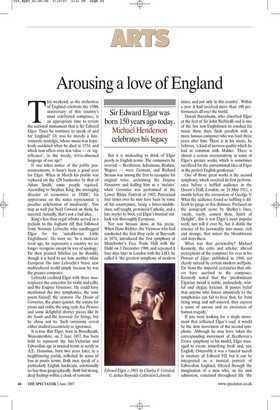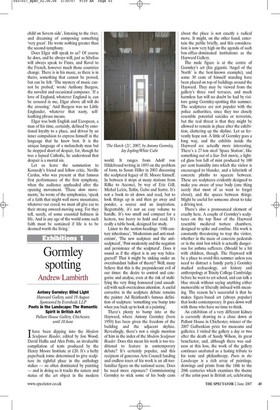Arousing a love of England
Sir Edward Elgar was born 150 years ago today. Michael Henderson celebrates his legacy This weekend, as the orchestras of England celebrate the 150th anniversary of this country's most celebrated composer, is an appropriate time to review the national monument that is Sir Edward Elgar. Does he continue to speak of and for England? Or was he merely a lateromantic nostalgic, whose music was hopelessly outdated when he died in 1934, and which now offers even less value — or 'significance', in the weedy, trivia-obsessed language of our age?
If one takes notice of the public pronouncements, it hasn't been a good year for Elgar. When in March his profile was replaced on the £20 banknotes by that of Adam Smith, some people rejoiced. According to Stephen King, the managing director of economics at HSBC, his appearance on the notes represented 'a peculiar celebration of mediocrity'. You may as well put Noel Coward on them, he sneered. Actually, that's not a bad idea.
King's less than regal rebuke served as a prelude to the foghorn riff that followed from Norman Lebrecht, who sandbagged Elgar for his 'antediluvian Little Englishness'. He went on: 'In a multicultural age, he represents a country we no longer recognise except by way of apology.' He then praised Sibelius (as he should), though it is hard to see how another white European fits into Lebrecht's brave new multicultural world simply because he was the greater composer.
Lebrecht credited Elgar with three masterpieces: the concertos for violin and cello, and the Enigma Variations. He could have mentioned the two symphonies, the tone poem Falstaff, the oratorio The Dream of Gerontius, the piano quintet, the sonata for piano and violin, the song cycle Sea Pictures and some delightful shorter pieces like In the South and the Serenade for Strings, but he chose not to. Such omissions reveal either studied eccentricity or ignorance.
It is true that Elgar, born in Broadheath, Worcestershire, on 2 June 1857, has been held to represent the late-Victorian and Edwardian age in musical terms as surely as A.E. Housman, born two years later, in a neighbouring parish, reflected its sense of loss in poetic terms. Both men speak of a particularly English landscape, emotionally no less than geographically. Both hid strong, deep feelings within a cloak of restraint.
But it is misleading to think of Elgar purely in English terms. The composers he revered — Beethoven, Schumann, Brahms, Wagner — were German, and Richard Strauss was among the first to recognise his original voice, acclaiming the Enigma Variations and hailing him as a `meistef when Gerontius was performed at the Lower Rhine Festival of 1902. Patronised four times over he may have been by some of his countrymen, being a lower-middleclass, self-taught, provincial Catholic, and a late starter to boot, yet Elgar's musical outlook was thoroughly European.
Nor was Strauss alone in his praise. When Hans Richter, the Viennese who had conducted the first Ring cycle at Bayreuth in 1876, introduced the first symphony at Manchester's Free Trade Hall with the Halle on 3 December 1908, and repeated it four days later in London with the LSO, he called it 'the greatest symphony of modern times, and not only in this country'. Within a year it had received more than 100 performances all over the world.
Daniel Barenboim, who absorbed Elgar at the feet of Sir John Barbirolli and is one of the few non-Englishmen to conduct his music these days, finds parallels with a more famous composer who was born three years after him There is in his music, he believes, 'a kind of nervous quality which he had in common with Mahler. There is almost a certain oversensitivity in some of Elgar's greater works, which is sometimes sacrificed for the conventional idea of Elgar as the perfect English gentleman.'
One of those great works is the second symphony, which received its first performance before a baffled audience in the Queen's Hall, London, on 24 May 1911, a month before the coronation of George V. What the audience found so baffling is difficult to gauge at this distance. Prefaced on the autograph score by Shelley's lines, 'rarely, rarely, comest thou, Spirit of Delight!', this is not Elgar's most popular work, nor will it ever be, but it distils the essence of his personality into music, rich and strange, that enters the bloodstream and stays there.
What was that personality? Michael Kennedy, the critic and scholar, altered perceptions of the composer for ever in his Portrait of Elgar, published in 1968, yet clearly unread by certain modern sniffpots. Far from the imperial certainties that others have ascribed to the composer, Kennedy noted that the 'predominant Elgarian mood is noble, melancholy, wistful and elegiac lyricism. It passes belief that anyone who listens attentively to the symphonies can fail to hear that, far from being smug and self-assured, they express a sense of unease and an awareness of human tragedy.'
If you were looking for a single movement that reflected Elgar's soul, it would be the slow movement of the second symphony. Although he may have taken the corresponding movement of Beethoven's Eroica symphony as his model, Elgar managed to create something fresh and, yes, English. Ostensibly it was a funeral march in memory of Edward VII but it can be interpreted as a musical portrait of Edwardian England, filtered through the imagination of a man who, on his own admission, remained throughout life `the child on Severn side', listening to the river, and dreaming of composing something 'very great'. He wrote nothing greater than the second symphony.
Does Elgar still speak to us? Of course he does, and he always will, just as Sibelius will always speak to Finns, and Ravel to the French, however much those countries change. There is in his music, as there is in theirs, something that cannot be proved, but can be felt. 'The mystery of music cannot be probed,' wrote Anthony Burgess, the novelist and occasional composer. `If a love of England, whatever England is, can be aroused in me, Elgar above all will do the arousing.' And Burgess was no Little Englander, whatever that nasty, selfloathing phrase means.
Elgar was both English and European, a man of his time, certainly, defined by emotional loyalty to a place, and driven by an inner compulsion to express himself in the language that he knew best. It is the unique language of a melancholy man but he stopped short of despair, for, though he was a lapsed Catholic, he understood that despair is a mortal sin.
Let us leave the summation to Kennedy's friend and fellow critic, Neville Cardus, who was present at that famous first performance of the first symphony, when the audience applauded after the opening movement. 'These slow movements,' he wrote of the symphonies, 'speak of a faith that might well move mountains; whatever our creed, we must all give ear to their strong onward-moving song. For they tell, surely, of some essential holiness in life. And in any age of the world some such faith must be sustained if life is to be deemed worth the living.'





















































 Previous page
Previous page